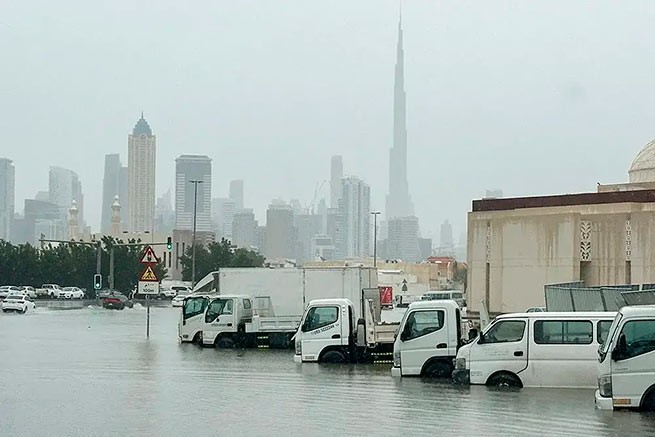Footage of a biblical disaster: roads turned into rivers and “drowned” very expensive cars. Torrents of water flooded homes and businesses. Residents and visitors to Dubai, one of the hottest and driest regions on the planet, were faced with an unprecedented reality last Tuesday.
🚨 BREAKING: Dubai is UNDERWATER as floods submerge the city pic.twitter.com/XN7hmkA4oJ
— Daily Mail Online (@MailOnline) April 17, 2024
https://www.instagram.com/reel/C52vltQr0dx
https://www.instagram.com/reel/C53aQlyPnhK
Videos flooding the internet show what looks like something out of a sci-fi film: Dubai International Airport – the world's second busiest – is completely covered in water. Huge planes try to cross flooded airport runways, kicking up waves of water in their wake. They look more like boats.
Dubai's streets turned into rivers after heavy rains and flash floods. pic.twitter.com/JTyioH2DMd
— DW News (@dwnews) April 17, 2024
In twelve hours, about 100 mm of rain fell in the area, which is the highest amount for the entire year. Experts note that this is one of the heaviest rainfalls that have fallen in the region over the past 75 years. In some areas, such as Al Ain, part of the emirate of Abu Dhabi, which borders Oman, it is estimated that more than 250 mm of rain fell in less than 24 hours. Once again it turns out that extreme weather events will now accompany every region of the planet.
“This is what we've been waiting for”
As Thodoris Giannaros, a physical meteorologist appointed as a research fellow at the Institute of Environmental Research and Sustainable Development at the National Observatory of Athens, told K, this is an extreme weather event: “This is what we expected to see with climate change. It has been seen for decades that such extreme weather events will occur even in areas that are not used to them. In this regard, such events should no longer surprise us when they are happening. The general impression is that we will have more extreme weather, and we are already seeing this in different parts of the world.”
https://twitter.com/CBSNews/status/1780612186840146188
Because, according to Mr. Giannaros, climate change “doesn't just mean a warmer, drier climate, as most people think. It means there will be an increase in the frequency of extreme weather events, whether we're talking about extreme cold or warm events.” Of course, he said, that doesn't mean that in dry areas like Dubai, “we'll start seeing an increase in rainfall.” However, within the overall hot and dry climate, it contributes to the occurrence of such extreme events even in these areas.”
“Something really extreme”
In turn, Konstantinos Lagovardos, director of research at the Athens Observatory, commented to the Greek media that “In many areas of the Arabian Peninsula, the annual rainfall is very, very low, less than a hundred millimeters. So when we see this rainfall, significantly higher than the annual norm, and in a very short period of time, it is something really extreme.”
flood storm in dubai pic.twitter.com/JgLm5Dcf6p
— Tp (@QFs_Global) April 17, 2024
On whether the phenomenon is related to climate change, he said that “an event that occurs once every fifty years is obviously extreme, but it should be studied whether the frequency of such events in the region is increasing over time. Only then will we be able to say “that this phenomenon is associated with climate change, which probably has a certain connection. In addition, warm seas and high temperatures for a given season can lead to similar phenomena.”
According to Lagovardo, we can expect other similar extreme events in dry areas such as Dubai in the coming years, “because we also saw in Libya, an arid place, that in the last phase of Daniel there was a large amount of rainfall. Of course there were also problems with construction of dams, and an undetermined number of thousands of people died in early September last year.”
Comparison with Cyclone “Daniel”
Regarding whether this phenomenon is similar to Cyclone Daniel, which hit our country, Mr. Yannaros spoke negatively, noting: “I don't think we can make a direct comparison between the two different regions, except perhaps for the analogy that exists in terms of how fast the rain falls.” IN at the same time, according to Mr. Yannaros, the consequences of such a phenomenon “depend not only on its speed, but also on the infrastructure and characteristics of the affected area. For example, the impact will be different in an area where there is vegetation and in an area where there is none. This particular area certainly doesn't have the same infrastructure that other areas where it rains a lot.”
Greece experienced 60 very severe weather events between 2000 and 2009, and the number increased to 90 between 2010 and 2019. Since 2020, we have seen this upward trend continue.

Commenting on his position, Mr. Lagovardos noted that this weather phenomenon is not similar to the weather Daniel, he said that “These are different types of severe weather. With Cyclone Daniel we had a long period of severe weather that lasted three days. They are not the same in scale or degree.” However, he said, both severe weather events “are classified as extreme weather events because the distribution of precipitation was extreme.”
H εκταση της καταστροφής στην Μεταμόρφωση είναι ασύλληπτη. Απο πού να ξεκινήσεις και πού να τελειώσεις τη διάσωση. Πώς ειναι δυνατόν να γλιτώσανε αυτοι οι άνθρωποι και πόσοι απο αυτούς? Πώς έφτασε τόσο νερό στο χωριό? #Καρδίτσα #κακοκαιρια #πλημμυρες pic.twitter.com/KRR4GBjZ3n
— -`🦊´- @alepouda (threads) (@alepouda) September 7, 2023
In our country, according to Mr. Lagovardos, there is “There is a clear increase in the number of severe weather events that we record through systematic cataloging.







More Stories
Crete "shaking" – two earthquakes this morning
Ecological… tombstones
Landslide on Santorini